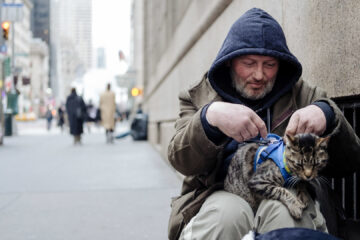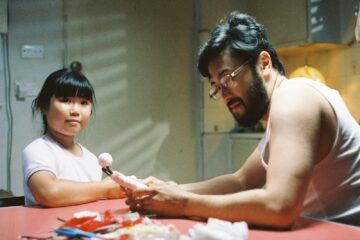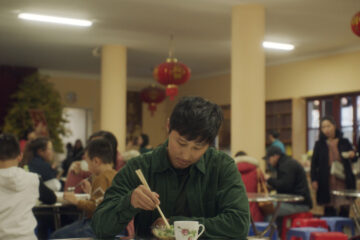As part of Viet Film Fest’s commitment to illuminating significant social issues and fostering community connections, Refuge After War will be proudly featured in our screening lineup. As part of the Crosscut Origins miniature docuseries, Refuge After War highlights the parallels of and intersections between Vietnamese and Afghan refugees in the aftermaths of the wars in their respective countries. In an exclusive interview with director, Thanh Tan, she discusses the influence of her journalistic background on the documentary, emphasizing its role in capturing the real experiences of Afghan and Vietnamese subjects impacted by current events and the importance of humanizing their stories.
How did your background as a journalist help inform your approach to Refuge After War? How would this differ from other documentary filmmakers who do not have a journalism background?
My training as a journalist is at the heart of everything I do as a storyteller. Being able to research, report and assess truth is so vital to documentary filmmaking – I really do believe that life can be stranger than fiction, and you have to be on your toes at all times. Years of writing on deadline has taught me to connect the dots quickly, as well as to embrace the art of the pivot. All of this was especially important in the making of Refuge After War, which is about real people impacted by and reacting in human, unexpected ways to a major current event that they neither asked for nor could control. It’s safe to say the film series we ended up with is not what I had originally envisioned.
What was your personal reaction to the August 15, 2021 Fall of Kabul?
Sadness and a strange sense of déjà vu. I was born well after the Vietnam War ended and believed into my early 30s that it wasn’t really my conflict to process. But a lot of therapy and reflection over the years has shown me that the past really is prologue, and I’ve become obsessed with making sense of our shared lived experience and exploring the concept of intergenerational trauma.
I’ve seen my fair share of the famous images we all associate with the fall of Saigon – helicopters lifting off buildings and desperate Vietnamese scaling gates, clamoring for help. When I saw the desperation in peoples’ eyes and the events unfolding in Kabul on Aug. 15, 2021, I immediately felt shame over our collective inability to learn from history. Afghanistan is not the same as Vietnam, but there’s no denying some of the parallels with regard to the U.S. presence in both countries over a long period – and its hasty exit with little regard for our allies on the ground.
What compelled you to make this film and how did Seattle’s local PBS station, KCTS, get involved?
I started filming interviews with fellow Vietnamese helpers on Aug. 20, 2021 – five days after the fall of Kabul. I honestly didn’t know at the time what we would do with that video; I just felt in my bones it was important to document the crisis as it unfolded, and I had no issues sharing some of the video with news outlets in hopes that we could generate attention for the plight of Afghan refugees. In the process, I got seriously sidetracked by becoming an accidental humanitarian and working with my friends to form Viets for Afghans, a mutual aid project to provide emergency support for incoming Afghan refugees.
In the midst of doing that volunteer work, KCTS executive producer Sarah Menzies reached out to see if I might be interested in collaborating with KCTS to tell the story of how Afghan refugees were adjusting to their new lives in Washington state. After months of focusing on direct services, I came to the realization it was time to pivot back to my core strength – storytelling – as a means to share what I’d learned and scale our efforts to help humanize as many refugees as possible.
Luckily, the station gave me time to wind down my volunteer work and sunset Viets for Afghans. We then leveraged what I had already begun filming months before, expanded our production to include many interviews with a mix of Vietnamese and Afghans, and ended up with a five-episode series that you see in Refuge After War. I would not have been able to direct this project with KCTS’ support on so many levels.
How did you decide upon the organization of your work, in terms of which topics would be covered in their respective parts?
Many hours of meetings, interviews, research, and analysis based on my more recent exposure and direct ties to the Afghan community from 2021 to the present – and the many years of reporting I’d done previously trying to make sense of how the Vietnamese American community grew across the United States. I also can’t thank our team enough for helping me to sort through the mountain of information to draw out key themes that we could tell visually through a series of short films. I am a creative who thrives on collaboration, feedback and editorial guardrails. So this is a great moment to thank editor Dave Wulzen, producer Shannen Ortale, director of photography Bryce Adolphson, and executive producer Sarah Menzies for reining me in and keeping me focused. Since I have a full-time job on top of my volunteer work, they had to deal with my crazy schedule.
How did you find your interview subjects for this film?
Through years of reporting on the Vietnamese community and through my contacts and relationships formed in the course of providing mutual aid to Afghan refugees via Viets for Afghans. I had to set clear boundaries and expectations, and never wanted anyone to feel pressured to speak before they were ready, so there was a ton of work done to build trust with subjects before the cameras ever rolled.
Was there anything shared among your interview subjects that you wished to incorporate into your film but, for any reason, had to omit in your final cut?
Yes. We had far too many interviews and not enough time to give every interviewee their due. Every person we spoke with had a backstory deserving of its own film. My one regret is not being able to include the powerful conversation between a Vietnamese American veteran of the Afghan war, a Vietnam War veteran and an Afghan servicemember. Maybe in the next film.
Do you have any resources for the Vietnamese diaspora (and beyond) on how to help Afghan refugees?
Get in touch with your local refugee service provider and go from there. Or check out welcome.us and see how you might sponsor refugees. It’s important to note that there are so many refugees from many other countries equally deserving of assistance. We should not pit them against each other for any reason.
(Interviewed by Eric Nong)
####
In-person at the Frida Cinema in Santa Ana, California, Refuge After War will be preceded by the short films Flowing Home and The Waves Now Calm at Viet Film Fest 2023 at 12:30 PM on Saturday, October 7. Following the screening, there will be a special panel on the similarities, differences, and potential areas of collaboration between the Afghan and Vietnamese American refugee communities.
Virtually, viewers in the U.S. will see Flowing Home and The Waves Now Calm before Refuge After War. Viewers outside the U.S. will see Think of Something Beautiful in place of Flowing Home.
About Thanh Tan
Thanh Tan is an award-winning multimedia storyteller and creator/host of Second Wave, a groundbreaking podcast from PRX and KUOW tracing the experiences of Vietnamese refugees after the war ended in 1975. Her reporting and writing has been featured across all platforms, including This American Life, The Seattle Times and The New York Times. For the first 12 years of her career, she served as a journalist and on-air reporter for the CBS affiliate in Boise, Idaho, the ABC affiliate in Portland, Oregon, The Texas Tribune, and The Seattle Times editorial board. She has received two national Sigma Delta Chi awards from the Society of Professional Journalists and produced two regional Emmy-winning documentaries for Idaho Public Television (PBS). As a storyteller for Microsoft Public Affairs and Microsoft President Brad Smith from 2016 through 2020, she traveled to six continents – producing, reporting and explaining the broad impact of technology on global societies through more than 50 original video stories. In 2020, she co-founded Viet Fact Check, a bilingual website that provides fact-checked articles in Vietnamese and English. Immediately following the fall of Kabul in August 2021, she helped to co-found Viets for Afghans, a Vietnamese-led volunteer coalition that’s mobilizing communities to help Afghan refugees. She is now balancing dual careers as a senior writer/storyteller for Starbucks Stories and independent filmmaker.
VIET FILM FEST 2023
September 30th to October 15th, 2023
Program Schedule and Tickets:



0 Comments